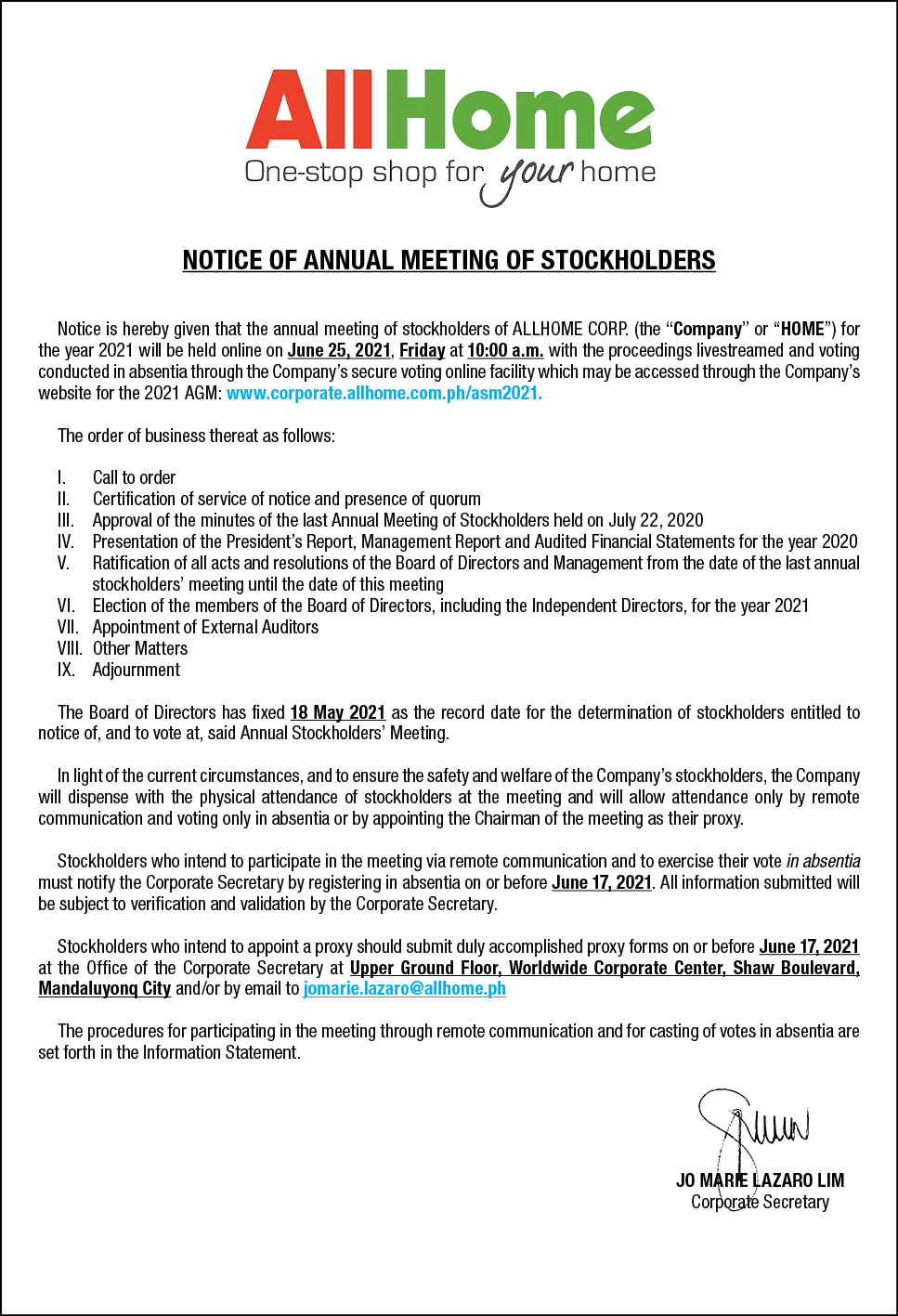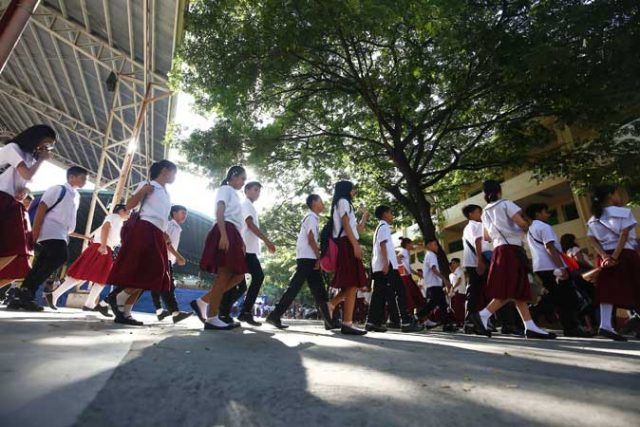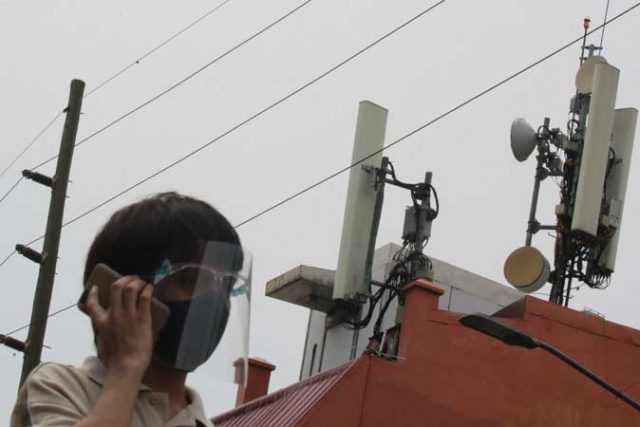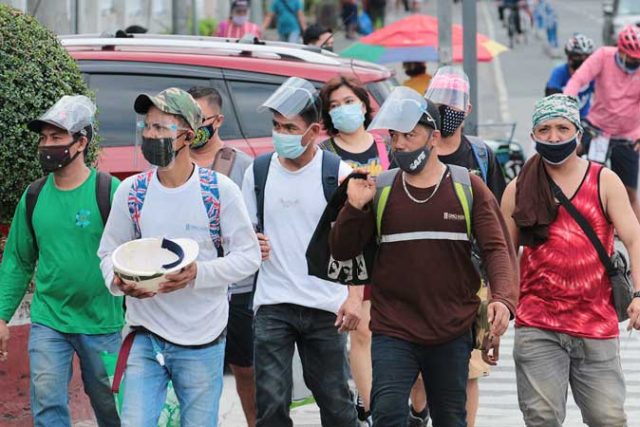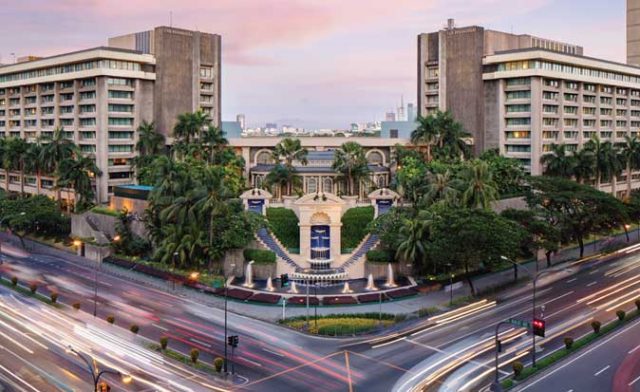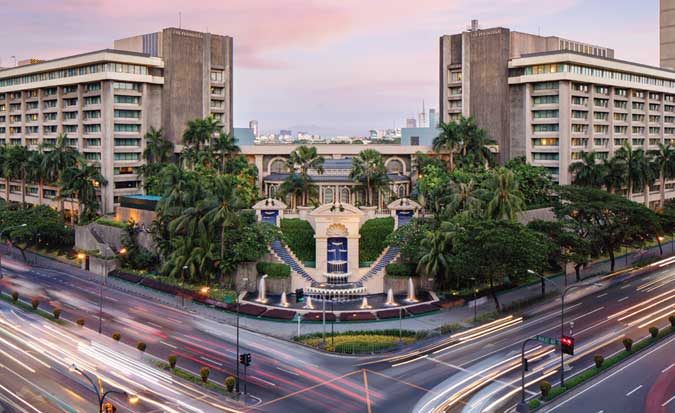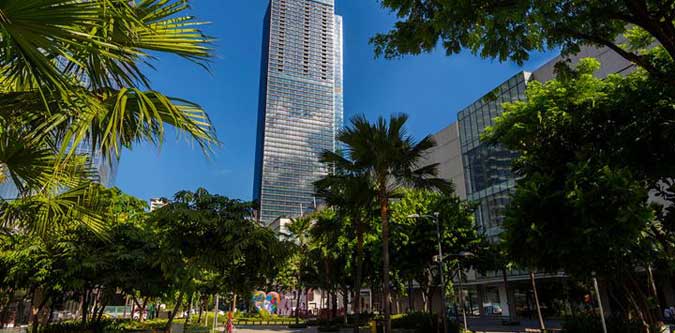Philippine Business Bank to hold its virtual stockholders’ meeting on June 25
NOTICE OF ANNUAL STOCKHOLDERS’ MEETING
TO ALL STOCKHOLDERS:
NOTICE IS HEREBY GIVEN that pursuant to Section 4, Article II of the Amended By-Laws, the Annual Stockholder’s Meeting of PHILIPPINE BUSINESS BANK (“PBB”) will be held on Friday, June 25, 2021 at 2:00 PM to be conducted virtually via Zoom, due to the COVID-19 pandemic situation, to confirm and ratify the following agenda, to wit:
- Call to Order
- Proof of Notice of Meeting
- Certification of Quorum
- Approval of the Minutes of the Annual Stockholders Meeting held on August 07, 2020
- President & CEO’s report on management operations for 2020
- Ratification of the Audited Financial Statements for the year ending 31st December 2020
- Ratification of Past Actions of the Board and of Management
- Ratification/Confirmation of the appointment of external auditor by the Board of Directors
- Election of Directors for 2021-2022
- Approval of the Amendment of the Bank’s Article 7 of the Articles of Incorporation
- Other Matters
- Adjournment
Only Stockholders of Record as of 5:30 p.m. of June 04, 2021 shall be entitled to vote at this meeting.
REQUIREMENTS AND PROCEDURES FOR ELECTRONIC VOTING IN ABSENTIA AND PARTICIPATION BY REMOTE COMMUNICATION
1. Registration
Stockholders intending to participate virtually should pre-register at corpsec@pbb.com.ph on or before June 15, 2021 along with the following requirements:
- Scanned copy of valid government-issued ID showing the photo, signature and personal details.
- Contact number and valid/active e-mail address.
- For Corporate stockholders, scanned copy of the Secretary’s Certificate authorizing the representative to participate in the virtual meeting for and in behalf of the corporation.
- For Scripless Stockholders or under PCD Brokers, scanned copy of the Broker Certification on the stockholder’s number of shareholdings.
Validation process will be conducted together with Stock Transfer Services, Inc. (STSI). Successful registrants will receive an electronic confirmation via email with instructions on how to join the virtual meeting.
2. Electronic Voting In Absentia
All agenda items will be available in the link above-mentioned. Stockholders can vote on each agenda item and may choose to vote “Vote for Approval”, “Vote Against” or “Abstain”.
For the election of directors, a stockholder may distribute his votes equally among all the nominees or cast such number of votes for each nominee as preferred by the stockholder, provided that the total number of votes cast shall not exceed the number of shares owned by the stockholder, multiplied by the number of directors to be elected.
The Office of the Corporate Secretary, with the assistance of the STSI’s representatives, will count and tabulate the votes cast in absentia together with the votes cast by proxy.
III. Participation through remote communication
The Bank’s ASM will be broadcasted live and successful registrants can participate via remote communication. Instructions and procedures on how to attend the meeting through remote communication will be sent to the email address of the stockholder indicated in the registration form.
Stockholders who will not be able to join the virtual meeting may send their authorized representatives on their behalf. The Proxy instrument must be duly notarized and must be submitted on or before June 15, 2021.
For Proxy forms and other concerns, you may email us at corpsec@pbb.com.ph.
Due to the continuing COVID-19 pandemic the Definitive Information Statement and other relevant documents in relation to the annual stockholders’ meeting may be accessed through the Bank’s Official Website www.pbb.com.ph and through the PSE EDGE portal at https://edge.pse.com.ph
The meeting will be audio and virtually recorded and a copy of which will be available upon request.
All votes will be validated by our external auditor, Punongbayan and Araullo (P&A).
ATTY. ROBERTO S. SANTOS
Corporate Secretary
Senate approves new tax on POGOs
By Vann Marlo M. Villegas, Reporter
THE Senate on Wednesday approved on third and final reading a measure imposing taxes on Philippine Offshore Gaming Operators and their foreign employees, as the government seeks new revenue sources amid the coronavirus pandemic.
With 17 affirmative votes, three negative votes and no abstention, the senators approved Senate Bill No. 2232 which sought to amend provisions of the National Internal Revenue Code of 1997 to impose a tax regime for POGOs.
Senators Franklin M. Drilon, Francis N. Pangilinan, and Risa N. Hontiveros-Baraquel voted against the measure.
Certified as urgent by President Rodrigo R. Duterte, the bill was approved on second and third reading during Wednesday’s session.
Under the bill, offshore gaming licensees, whether Philippine-based or abroad, but are considered doing business in the Philippines will be subject to 5% gaming tax on gross gaming revenues or receipts from their gaming operations. The gaming tax will be imposed in lieu of all taxes.
Foreigners employed by offshore gaming licensees and service providers will also have to pay 25% final withholding tax rate. The measure provided that their monthly minimum final withholding tax should not be lower than P12,500.
Non-gaming revenues of Philippine-based offshore gaming licensees shall also be subject to a 25% income tax. Non-gaming revenues attributed to game offerings or facilities within the Philippines of foreign-based offshore licensees shall be pay income tax equivalent to 25% of gross income yearly.
Senator Juliana Pilar S. Cayetano, sponsor of the bill, inserted a provision stating that 60% of the revenues collected from the gaming taxes imposed on offshore gaming licensees shall be allocated to the following: 60% for Republic Act No. 11223 or the Universal Health Care Act, and 20% each for the Health Facilities Enhancement Program and for the attainment of Sustainable Development Goals.
The Senate also adopted the proposed amendment that a POGO’s foreign employee may be subject to deportation and may be barred from entering the Philippines due to failure to pay taxes.
Mr. Pangilinan, in explaining his vote, said sharp rise of the POGO industry came with “serious social costs,” citing instances of criminal activities involving their foreign workers. He also noted the Chinese government has asked the Philippines to close POGO operations as they were used in “cross-border crimes such as money laundering.”
“Whatever amount the BIR collects from POGOs may be used to fund projects to give relief to our people’s suffering during this pandemic. However, we cannot and should not turn a blind eye away from the social costs that the POGO industry brings and has brought upon us,” Mr. Pangilinan said.
“Social costs that may be difficult to reverse. Instead of allowing POGOs to thrive, perhaps we ought to have re-allocated funds from other sources to support our pandemic relief efforts,” he added.
As Luzon grid sees supply shortage, Gencos ordered to explain outages
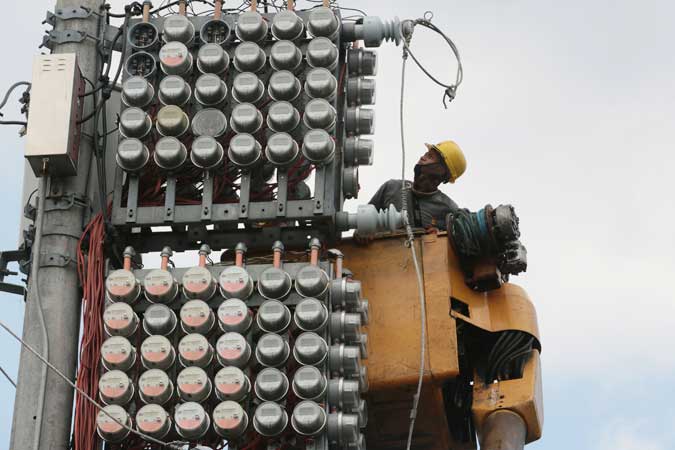
By Angelica Y. Yang, Reporter
THE ENERGY Regulatory Commission (ERC) on Wednesday said it will order generation companies (gencos) to explain plant shutdowns, as the grid operator raised a red alert on the Luzon grid for the third time this week.
“We will be determining who are on outage again and require them to explain. [V]irtual inspections, if necessary, will be conducted,” ERC Commissioner-in-Charge Floresinda G. Baldo-Digal told BusinessWorld on Viber on Wednesday.
The commission ordered erring gencos to explain why they have breached the limit of allowable unplanned outages this year.
ERC Chairperson Agnes VST Devanadera in a statement said there were some gencos that have exceeded the maximum limit as of April 2021.
Data obtained by BusinessWorld showed that the ERC issued notices of noncompliances to 17 gencos operating a total of 35 plants from May 12 to 18. Of the number, the commission has received replies from 13 gencos to date.
Rotating outages continued in parts of Luzon, including Metro Manila, on Wednesday, as the National Grid Corp. of the Philippines (NGCP) once again raised a red alert on Wednesday.
The NGCP initially reported a deficit of 716 megawatts (MW), as the peak demand hit 11,976 MW and available capacity stood at 11,260 MW.
The Department of Energy (DoE) in a separate statement said an additional 388 MW of oil-based, hydro, biomass and solar plants were declared as “derated” or reduced on Wednesday.
Latest data showed that the forced outages reached 1,314 MW on Wednesday, due to the unavailability of unit 2 of the Pagbilao coal plant; units 1 and 2 of the GNPower Mariveles Energy Center’s coal plant, and unit 2 of the Calaca coal plant.
The total planned outages, on the other hand, hit 435 MW, as three units of the San Roque Power Corp.’s hydro power plant remained offline.
The DoE said that the red and yellow alerts issued during peak hours on Wednesday were lifted due to low system demand and the synchronization of unit 2 of the 647-MW Sual coal plant.
“The available capacity has improved with a net increase of up to 265 MW with the early entry of Sual Unit 2 despite the untimely forced outage of Pagbilao Unit 2,” it said.
JUNE RATES UNAFFECTED
Meanwhile, an official from Manila Electric Co. (Meralco) said that this month’s power rates will not be affected by the series of red alerts raised on the grid this week.
“The current power situation will be reflected in July rates,” Meralco Vice-President and Head of Utility Economics Lawrence S. Fernandez told BusinessWorld on Viber. He did not, however, give an estimate of the additional amount which customers had to pay when the grid went on red alerts since doing so would be “highly speculative.”
Mr. Fernandez noted that even before the spate of red alerts, the firm had experienced “high spot market prices since May due to reduced power supply caused by plant outages.” Last month, the average power price on the wholesale electricity spot market (WESM) more than doubled to reach P7.72 per kilowatt-hour (kWh), from P3.85/kWh in April.
“When rising demand coincides with reduced supply — as in the case of the power plant outages — there is pressure for spot market prices to go up,” Mr. Fernandez explained.
Independent Electricity Market Operator of the Philippines (IEMOP) spokesperson Andrea May T. Caguete separately told BusinessWorld in a text message that the estimated average WESM price from May 26 to June 1 is at P8.98 kWh, which she described as “substantially higher” than the rate recorded last month.
The DoE said that the secondary price cap is now in effect. The cap allows the market operator to limit prices at P6.246/kWh “to protect consumers from possible spikes.”
Private schools question tax hike; BIR stands firm
By Beatrice M. Laforga, Reporter
A GROUP of private schools is questioning the Bureau of Internal Revenue’s (BIR) recent issuance that more than doubled the tax rate on “for-profit” educational institutions, saying this will be a “very heavy burden” for the pandemic-hit sector.
In a statement on Wednesday, Coordinating Council of Private Educational Associations (COCOPEA) Managing Director Joseph Noel M. Estrada said the BIR should immediately rectify the “erroneous” provision under Revenue Regulation (RR) 5-2021 which raised the tax rate to 25% from 10%.
The regulation, issued on April 8, set the tax rates under the newly signed law Republic Act 11534 or the Corporate Recovery and Tax Incentives for Enterprises (CREATE) Act.
“Whereas the recently enacted CREATE Act sought to shore up proprietary educational institutions during the pandemic with a much-appreciated temporary reduction in the tax rate from 10% to 1%, RR 5–2021 will instead cause irreparable damage to the institutions and stakeholders that the Duterte Administration and Congress sought to help, by more than doubling their tax rate from the 10% that has been applied to them since 1968, to 25%,” Mr. Estrada said.
Mr. Estrada warned that the higher tax rate could force schools to permanently close, as they continue to struggle with the transition to the K-12 system and the sudden shift to online schooling amid the pandemic.
“The imposition of RR 5-2021, especially during this deep economic recession, will penalize, marginalize and discriminate against proprietary educational institutions with unfeasibly higher taxes that may force financially distressed schools to close down and trigger a radiating wave of economic disruption that will hit not just teachers and school personnel, but also the extensive network of linked small and medium businesses and livelihood activities of the host communities,” he added.
The CREATE law reduced the corporate tax rate for proprietary educational institutions to 1% from 10% originally, for three years from July 2020 to July 2023.
However, Mr. Estrada claimed the BIR inserted the word “non-profit schools” in the definition of proprietary educational institutions, which he said effectively limits the scope of the lower tax to just non-profit schools. This meant for-profit educational institutions will be subject to the regular corporate tax rate of 25%.
However, Finance Secretary Carlos G. Dominguez III stood firm that the BIR did not change the tax rates and only followed the original definition of the Tax Code when they crafted the regulations.
In its letter to COCOPEA, the BIR argued that proprietary non-profit educational institutions “can legally exist,” citing the definition of proprietary as “private,” under the Tax Code.
The bureau also said it already clarified the definition through a circular in 2012 saying that the 10% tax rate applies to proprietary non-profit schools and hospitals.
Under the National Internal Revenue Code (NIRC), those eligible for the 10% tax, now reduced to 1% because of CREATE, are “proprietary educational institutions and hospitals which are non-profit,” maintained by private individual or groups and have a permit to operate issued by regulators.
COCOPEA said it decided to make a public appeal to the Finance department and BIR after it did not receive any response.
COCOPEA is an organization of five biggest education associations representing around 2,500 private schools and education stakeholders.
The Department of Education and Commission on Higher Education did not respond to queries.
Regulatory safeguards in PSA bill needed — PCC
By Jenina P. Ibañez, Reporter
A COMPETITION commissioner is urging lawmakers to include regulatory safeguards against national security issues that some senators fear could arise from a priority bill that would open up the telecommunications and transport sectors to more foreign ownership.
Such regulations should be issued instead of outright banning bigger foreign participation in providing critical infrastructure, Philippine Competition Commissioner Johannes Benjamin R. Bernabe said in a phone interview on Monday.
“The push for liberalization can be better addressed through targeted regulation, which would ensure that the dangers we seek to guard against will be addressed through the appropriate regulatory framework,” he said.
The Philippine Competition Commission (PCC) supports amendments to the Public Service Act (PSA), including removing the foreign equity cap on the telecommunications and transportation industries.
The industries, which are considered public utilities, limit foreign ownership of the public utility company to 40%. The remaining 60% must be owned by Filipino citizens.
Certified as urgent by President Rodrigo R. Duterte, the Senate is currently deliberating its version of the bill seeking to amend the PSA to allow 100% foreign ownership of telco and transport firms. The House version has been approved on third reading.
Some senators have raised concerns on lifting the foreign ownership restriction, warning that it could threaten national security or favor a single country. Senator Risa N. Hontiveros-Baraquel said that the amendments could allow for China’s ownership of crucial infrastructure in the country.
But PCC’s Mr. Bernabe said that such concerns can be addressed through existing and potential safeguards, such as the concern that state-owned China Telecoms could take on 100% of DITO Telecommunity Corp.
“The question that I raise is: isn’t it that there’s also provision which says that a foreign-owned or controlled corporation through a state-owned enterprise of its own cannot be allowed to invest in a public service which is deemed to be part of the critical infrastructure of the country — for instance telecoms?”
“Secondly, the national security council, through the Office of the President which heads it, can vet any such investment and say that it’s a threat to national security and therefore not allow it,” he said.
Concerns over foreign competition hurting local tricycle and jeepney operators in the transport sector can also be addressed through rules requiring use of the local language or a minimum number of years of residence in the country, Mr. Bernabe said.
“If the legislators are so concerned about having appropriate regulations put in place, they can already put those regulations in the statute. For instance, if they want telecoms and common carriers not to be acquired by state-owned enterprises, then put that in the statute,” he said.
“If they want state-owned enterprise definition to include those which… are receiving substantial subsidies from foreign governments, include that in the statute.”
Mr. Bernabe said that inclusion of certain regulations could address concerns that regulators are “too familiar” with or financially influenced by the businesses they regulate.
“If you want owners or operators of common carriers to be residents of the Philippines for at least 10 years… put it in the statute if they don’t trust the regulators enough.” he said.
“And then offer a catch-all provision which would say that regulators in their relevant sectors are mandated to come up with regulatory requirements, whether they be qualification or licensing requirements which would address the need to safeguard the welfare of Filipino citizens.”
Mr. Bernabe is hoping his personal recommendations will be included in the position paper PCC plans to submit to the Senate.
“I think the dangers and concerns that (senators) flagged can be better addressed through regulation rather than resorting to limits on equity and liberalization,” he said.
Philippines likely to achieve ‘herd resilience’ by 2023, says Moody’s Analytics
THE PHILIPPINES will only likely fully vaccinate 65% of its adult population by 2023, as the economy is expected to return to pre-pandemic levels by the third quarter of 2022, Moody’s Analytics said.
Herd resilience or a situation when 65% of adult population have been vaccinated will only occur in the Philippines, Indonesia, Thailand, Taiwan, and Vietnam by 2023, according to Moody’s Analytics.
“Indonesia and the Philippines have been struggling to allot vaccines either due to access or simply the difficulty in getting the vaccine out through the public health systems across the country,” Moody’s Analytics Chief Asia-Pacific economist Steven Cochrane said in a webinar.
Based on data from the Johns Hopkins University, only 1.12% of the Philippine population have been fully vaccinated since its inoculation drive started in March.
Even as coronavirus disease 2019 (COVID-19) vaccine supplies are slow to arrive, the government is sticking to its target of vaccinating 50 million adult Filipinos by end-November. By the first quarter of 2022, the government hopes to have 70 million Filipinos vaccinated.
Moody’s Analytics Senior Asia Pacific economist Katrina Ell said the Philippines is expected to grow beyond its fourth quarter 2019 level only by the third quarter of 2022.
This makes the country the region’s laggard given that India and Indonesia, which have also seen relatively high infections, are both expected to surpass their pre-pandemic GDP level by the second quarter this year. Singapore and Japan are expected to exceed pre-pandemic economic growth by the fourth quarter this year.
Some countries in Southeast Asia are expected to take until the second quarter of 2022 to grow their economy beyond their pre-pandemic levels, including Thailand and Malaysia.
“The Philippines is the country that was least able to control COVID [even after] many, many quarantine orders,” Mr. Cochrane said.
“The Philippines also is probably the one country in the Asia-Pacific area that has not benefited from the turnaround in exports. They are not as quite tied to the global supply chain for goods as much as the rest of the region,” he added.
Moody’s Analytics in May said it expects the Philippine economy to grow by 5.3% this year, a less optimistic view than the government’s 6-7% target. The economy slumped by a record 9.6% last year due to the crisis. — L.W.T.Noble
Employers eye different policies for vaccinated, non-vaccinated workers
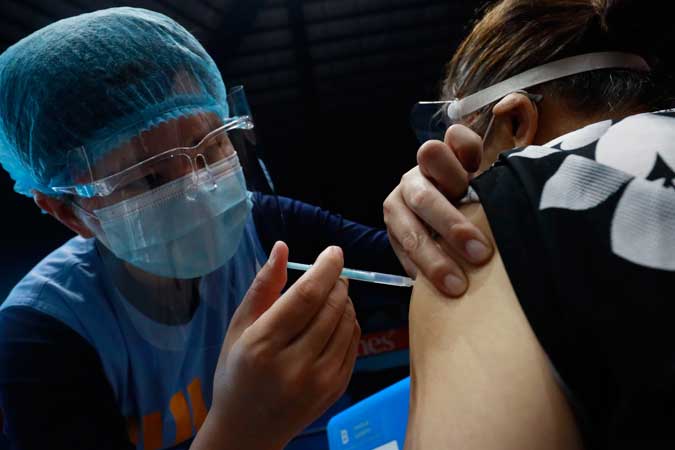
SOME PHILIPPINE employers are planning to have distinct policies for employees who have been vaccinated against the coronavirus disease 2019 (COVID-19) and those that have not been inoculated, a survey found.
Although most of the 60 Philippine companies surveyed by Mercer in February said they do not want to require vaccination, 41% of respondents said that having a workforce composed of vaccinated and non-vaccinated employees will be a concern.
Eight percent said they would enact distinct business travel policies between the two sets of employees, and 10% said vaccination is a condition for returning to the worksite, according to the report from asset management firm Mercer.
Around 7% said vaccines could be needed for certain types of work, such as those requiring direct customer contact.
In contrast, 30% said they will not differentiate policies based on vaccine status and 26% said they will follow government guidelines.
Just 2% of surveyed employers at the time planned to require their employees to be vaccinated against COVID-19, although more than half said they would encourage it.
Firms that said they would not require vaccination said so mostly due to employee concerns about vaccine safety and to comply with labor and human rights legislation. More than 40% feared potential liability if an employee experiences a bad reaction to the jab.
The survey was conducted before Republic Act No. 11525 or the COVID-19 Vaccine Program Act was signed on Feb. 26. Under Section 12 of this law, the vaccine card which is issued to all vaccinated individuals should not be a mandatory requirement for employment.
Only 2% of the survey respondents said they would offer cash or gift card incentives for workers who get inoculated. Almost half said they would definitely not provide incentives, while 41% are considering it.
“However, one in four have stated that they will provide additional time off for employees to get vaccinated,” Mercer said in a statement on Wednesday.
Just a third or 32% of Filipinos are willing to get vaccinated against COVID-19 given that the vaccines would be free and approved by the Food and Drug Administration, a recent survey from Social Weather Stations (SWS) said. Another 33% said they are unwilling, while 35% are uncertain.
More than two-thirds of the firms surveyed by Mercer said they have developed or are developing communication plans on the jab.
“Given that the major issues surrounding the vaccination rollout are vaccine safety and human rights legislation, it’s not surprising that most respondents opted not to offer any form of incentive to respect their employees’ personal decision,” Mercer Philippines Chief Executive Officer Maria Theresa E. Alday said.
“The decision to receive the vaccine ultimately boils down to trust. And employers play a critical role in educating and sharing accurate information with employees, including facts about the benefits of the vaccines, company policies and insurance coverage.’’
Almost all the companies said they are communicating the benefits of the vaccine, while 76% shared details about access and 66% offered information on company policies. Less than half said they are sharing details about insurance coverage and reimbursement.
“This could be due in part to a lack of clarity or information at the moment but is absolutely critical information that employees need to know, be it details on claims or benefits with respect to the COVID-19 vaccination or its potential effects,” Ms. Alday said.
While just 13% have started discussing vaccine delivery with public health officials and vendors, 72% of respondents said they are looking into facilitating employee inoculation. A quarter said they formed a group that would guide their vaccine-related policies.
“What’s vital is that employers set appropriate expectations about returning to the office and the need for precautions and safe practices like wearing masks and social distancing. Even as the number of individuals being vaccinated increases, various forms of public health restrictions will still be in place until we see herd immunity in our communities,” Ms. Alday said. — Jenina P. Ibañez
Pandemic helps boost stock market accounts by 13.7%
TOTAL stock market accounts went up 13.7% to 1.396 million last year as the pandemic prompted investors to sign up online to trade in the local bourse, the Philippine Stock Exchange, Inc. (PSE) said.
Of the total, 67% were comprised of online accounts while the remaining 33% were made up of non-online accounts, it said in a statement on Wednesday.
“The preference for opening online accounts continues to rise since technology has made investing more accessible to investors. At the PSE, we also continue to enhance and develop online services that will benefit the investing public,” PSE President and Chief Executive Officer Ramon S. Monzon said.
According to the stock market operator, online accounts increased 19.7% to 936,200 in 2020 against 782,118 the earlier year, while non-online accounts rose 3.3% to 460,553 from 445,920 in 2019.
Of the total stock market accounts, retail investors held 97.9% or 1.366 million accounts while institutional investors cornered 2.1% or 29,898 accounts.
PSE added that 98.5% or 1.376 million accounts were held by local investors while 21,233 accounts were owned by foreign investors.
“We noted that there was a 35.6% increase in the number of active accounts last year. The pandemic prompted retail investors to actively participate in the stock market,” Mr. Monzon said.
Meanwhile, PSE said that based on its 2020 stock market investor profile report, male investors made up 50.8% of the total stock market accounts while 49.2% were owned by female investors.
Investors aged 30 to 44 years old held 45.6% of total stock market accounts, followed by those aged 18 to 29 years old at 22.5%. Those in the 45-59 age bracket accounted for 19.8%, while investors aged 60 years old or older made up 12.1%.
Further, PSE said retail investors earning less than P500,000 annually took up 61.2% of stock market accounts, trailed by those earning P500,000 to P1 million at 21.6%, and those with income of more than P1 million at 17.2%.
Domestic investors took up 98.3% of stock market accounts while overseas-based investors held 1.7%.
Of the domestic investors, 75.7% were based in Metro Manila, followed by 13.5% for the rest of Luzon, 5.7% in Visayas, and 3.4% in Mindanao.
“The real estate investment trust (REIT) listings we’ve had attracted a good number of retail investors, particularly local small investors who use PSE EASy for their initial public offering (IPO) subscriptions. We expect the upcoming IPOs and REIT listings to continue to support the growth in retail investors,” Mr. Monzon said. — Revin Mikhael D. Ochave
Now that staycations are allowed again, where can you go?
THE ECONOMY is slowly starting to move again with the lifting of some quarantine restrictions, including those on hotels which are now opening up to accommodate staycations and leisure guests — with some limitations.
On May 28, the Department of Tourism (DoT) said in a statement: “AEs (accommodation establishments) in areas under GCQ (general community quarantine) may accept bookings provided that guests will come from the same household, and only up to 30% of the venue capacity.” Moreover, the DoT website says, “Staycations for all ages are allowed but guests below 18 and above 65 years old shall be required to present a negative result from an RT-PCR test taken not more than 72 hours prior to check-in.”
Not all hotels are allowed to accept staycation guests though. “The tourism chief reiterated that isolation or quarantine hotels are not allowed to accommodate leisure or staycation guests. The IATF resolution likewise states that the local government units with jurisdiction over the AEs shall strictly monitor their compliance with minimum public health standards,” said the DoT statement.
Here are some of the properties that have opened up since the announcement, along with their amenities and facilities that will be available to staycation guests.
SHANGRI-LA AT THE FORT
Guidelines:
Staycations are allowed for NCR, Laguna, Cavite, Rizal, and Bulacan residents only.
Guests must also present a government-issued ID with an address in the places mentioned above.
Only guests between the ages of 18 to 65 years old are allowed, although those outside the age bracket are now allowed to dine in at the hotel’s restaurants.
Physical distancing must be observed at all times, and the use of face shields and masks are required to enter dining establishments.
Pregnant guests and those with co-morbidities are not allowed to check in.
Guests should present a negative Rapid Antigen Test result taken within 24 hours before checking in or an RT-PCR test taken within 72 hours before checking in.
The hotel has an on-site Rapid Antigen Test facility open daily from 8AM to 4PM. The test is available at P1,800 net per person with prior reservations required.
Facilities available:
Restaurants:
Bake House — Open daily from 7 a.m. to 8 p.m.; indoor and outdoor seating with limited seating capacity (no reservations, first come, first served.)
Raging Bull Burgers — Open daily from 10:30 a.m. to 10:30 p.m. with outdoor seating for two persons only (no reservations, first come, first served.)
Samba — Open Monday to Friday for breakfast at 7 to 10 a.m., and lunch to dinner at 11 a.m. to 10 p.m. Weekend hours are from 7 to 10:30 a.m., and 11:30 a.m. to 10 p.m.
Raging Bull Chophouse and Bar — closed Monday and Tuesday, open Wednesday to Sunday from 5 to 10 p.m.
The hotel highly encourages making prior reservations at Samba and Raging Bull Chophouse and Bar for both lunch and dinner as there are limited seats available due to the capacity allowed by the local government.
The pool, which is open daily from 7:30 a.m. to 3 p.m., is open only for guests who are checked in. Prior reservation is required since the hotel only allows a certain number of people in the pool and guests may only stay at the pool area for one hour.
Room Rates: Deluxe Room — P6,950++ (P8,510.28 net); Deluxe High Street View — P7,450++ (P9,122.53 net); Executive Suite — P11,950++ (P14,632.78 net); Premier Suite – P14,950++ (P18,306.28 net). Room rates are inclusive of set breakfast set for two persons.
GRAND HYATT MANILA
Guidelines:
Guests can expect all hotel staff in face masks beginning at the entrance, to the reception, to the many restaurants and hotel facilities.
Temperature scanners are positioned at entrances and hand sanitizers are provided at strategic locations. Social distancing markers have been placed to guide customers to stay at least one to two meters apart when lining up, and one seat apart when dining in restaurants.
Pick-up points have been installed at the entrance for online food orders.
While the hotel offers rapid antigen tests at P2,000 per person, guests are free to get the test done with their preferred healthcare provider and bring the test results with them to check in.
Facilities available:
The Peak, Dine at Home, The Pool House, Gym, Pool, The Lounge
Room Rates:
The hotel’s room rates start with the Grand Escape package starting at P9,888 net for a Grand King room. This includes a personal hygiene and safety kit with masks, sanitizing wipes and a hand sanitizer; breakfast for two, 20% off on The Peak and Pool House transactions during their stay, 50% off on laundry services, and early check-in and late check out rates (subject to availability). For P12,000, one can get the same inclusions with the addition of two rapid antigen tests.
THE PENINSULA MANILA
Peninsula Manila is celebrating its reopening with a Father’s Day promo.
Facilities available:
Spices (opening June 9) — outdoor dining available
The Lobby is also open with a 20% off “We Meet Again” Dinner promotion available on Monday, Tuesday, and Wednesday nights. A Father’s Day promo is also set for the Lobby on June 19 and 20 centered around beef. One can also order Father’s Day platters in advance (for take-out and delivery) at the Peninsula Boutique.
Pool
Fitness Center
Room Rates:
Room rates for a Do Not Disturb: Dad’s Resting Father’s Day promo start at P8,500 for a deluxe room, inclusive of taxes and two complimentary on-site Rapid Antigen Tests. The rate includes: a set breakfast for two at The Lobby and two servings of The Peninsula’s classic Halo Halo Harana, and a complimentary Lobby dinner when accompanied by a paying guest.
OKADA MANILA
Facilities available:
Restaurants:
Catch by the Bay — 11 a.m. to 11 p.m.
BBQ by the Bay — open for outdoor dining from Friday to Sunday at 5 to 10 p.m.
Medley Buffet — open for lunch at 11:30 a.m. to 3 p.m. and dinner at 6 to 11 p.m.
Grooming and Pampering:
The Retreat Spa, the Salon, and the Barbershop are open from 10 a.m. to 10 p.m.
The Fitness Centre and Spa Pool are open from 8 a.m. to 10 p.m.
Retail Outlets:
The Gift Boutique and Lucerne are open Wednesday to Monday from noon to 8 p.m.
Room Rates
Okada Manila’s room rates for its reopening start at P8,888++ (Deluxe King Room, for one night, for one guest, with breakfast for two). There’s also a “Salamat Frontline Heroes” promo with free breakfast for two, P2,000 in dining credits for one night, for one guest, at P9,888.
SEC to new financers, lenders: register with anti-dirty money body
THE corporate regulator has ordered new financing and lending companies to register with the Anti-Money Laundering Council (AMLC) through its online portal on or before June 21.
In a notice posted on its website on Tuesday, the Securities and Exchange Commission (SEC) said that the newly covered financing and lending companies must comply with the requirements, adding that compliance officers must also update their firm’s user accounts in the AMLC portal every two years.
“Those who are not yet registered at the AMLC are given until June 21, 2021 to register and submit proof of such registration to the Anti-Money Laundering Division of the Enforcement and Investor Protection Department of the Commission,” the SEC said.
The covered firms must register or update their information through the AMLC’s online registration system. They must subsequently submit to the council a copy of their certificate of registration issued by the council through the firms’ official e-mail addresses.
The proof of registration must be submitted to amld-amlcreg@sec.gov.ph.
The SEC clarified that the firms need not submit a hard copy of their respective registration certificates. Those that fail to register or update their information with the AMLC will incur penalties under the 2018 implementing rules and regulations of Republic Act. No. 9160 or the Anti-Money Laundering Act of 2001, as amended.
In March, the SEC said that all financing and lending institutions are now covered under the commission’s guidelines on anti-money laundering and combating the financing of terrorism. The previous rules only covered financial and lending firms that had over 40% foreign participation in its voting stock, and those with a paid-up capital of P10 million or more. — Angelica Y. Yang
2020 Doreen Gamboa Fernandez Food Writing Award: The bitter, the better
By Shulamite Maiden Pormentira
(Honorable Mention in the 2020 Doreen Gamboa Fernandez Food Writing Award)
NOVEMBER 2016.
A familiar aroma welcomed me and my mother in my grandparents’ home in California. My uncle was in the kitchen scooping us a heaping bowl of pinapaitan. This was our first day as immigrants. My mother was committed to residing here for good while I was already planning my return to the Philippines to finish my studies. That first sniff and sip of the bitter soup made me feel like I was still in my hometown, Baguio City.
Nov. 2020 marks my first year since I finally moved to California for good after college. I am now scooping myself a ladle-full of this hot and bitter dish and pouring it over leftover rice. The heat and oil of the soup softens and breaks down the grains of rice as it warms up the entire bowl, ready to eat. Somehow, the homesickness is undoubtedly fought off by the lingering taste in my mouth.
My Ilocana mother often cooked soup dishes to compliment the cold Baguio weather. The pinapaitan or papaitan is one of those Ilocano dishes which I savor regardless of weather. Mother would wake me up at six in the morning, seven the latest, on a Saturday to go to the talipapa (satellite market) behind Baguio Medical Center. Although a bit groggy at times, I did not mind our regular Saturday morning endeavor. Arriving after 8 a.m. in the talipapa meant going meatless for a week or two! We had to be there for the newly butchered cow, pig, and goat amongst other fresh produce. Our checklist was as follows: beef shank for bulalo, beef sirloin for tapa, pork belly and ribs for adobo, sinigang (sour soup), or nilaga (boiled), goat ribs, feet, and head for sinampalukan (tamarind stew), goat thigh and shoulder for caldereta (tomato sauce stew), and the elusive combination of goat innards and papait (bile). The latter was what we and the other shoppers scrambled for. Goat’s meat was always the first to be sold out. If we were lucky, we’d get to bring home an extra bag of papait. The fresh papait is the bitterness I’m longing for, which groceries overseas lack.
“Neighbors, who are usually relatives, would get together to gather and butcher the goats in the fields,” as my mother remembers how goat-based dishes are prepared in their province of Pangasinan. The men bring the newly butchered goat to the pulpogan (torching station) to hang and manually torch over coal or wood fire until burn marks on the skin are visible. This adds flavor to the meat when cooked. Afterwards, the goat is washed and patted with walis tingting (a broom made from the midribs of palm leaves) to make sure that fur and char is completely washed off. The goat’s parts go towards sinampalukan and caldereta. No part of the goat is wasted! The innards and papait are for the pinapaitan. This is the internal organ where the bitter bile comes from and is what we call the bittering ingredient. This dish has an unappealing smell to some people, but “not if the butchering is done right,” as elders say. Bayanihan, communal cooperation, is vital.
There is such an appeal to the pinapaitan’s preparation as my mother still remembers how her grandmother used to call them to watch the process even as a child. And as my mom learned and did with her elders, I also learned and did with her even with the advent of modernization. I start by handing her chopped onions, garlic, ginger, and innards respectively for sautéing. She continues to stir until water comes out from the innards. Goat stock is added for the soup itself, its savory kick, and to cook the ingredients all the way through. Bring to a boil and add the papait (Repeat). Add the long green chilis on the last simmer. Slow cooking is the key. Sometimes, we add tamarind leaves as my father prefers. The soup is best served hot with rice or over gin and tales. As for me, a side of extra papait please! After all, what is pinapaitan if not bitter?
Uncertain of the date when I can return to my hometown, the bitterness I feel — homesickness rather — can still be soothed with a bowl of soup. The bitter dish eases my bitter feelings. I have only cooked the -pinapaitan twice in my lifetime, and always with my mother’s guidance. One day I will muster up the courage and skill to lead the cooking process and tell the stories. The struggle of early Saturday mornings, the noise of the talipapa, the marvel of heritage stories, the hard work of the cook, and the large pot that holds a dish that our family and neighbors can share and a sense of community — this is when I know I’m home. This is when I know it’s all better.
THE DOREEN Gamboa Fernandez Food Writing Award (DGF Award) recently announced the winners of the 2020 competition. The subject matter was “Livestock,” which, in the Philippines refers to cattle, pigs, goats, carabaos, and horses. The DGF Award is now in its 19th year. Named after the late dean of food writers, Doreen Gamboa Fernandez, it was founded to encourage writers to contribute to Philippine food literature. The winning essays of the first 15 years have been published in two books — Savor the Word and Sangkap.

